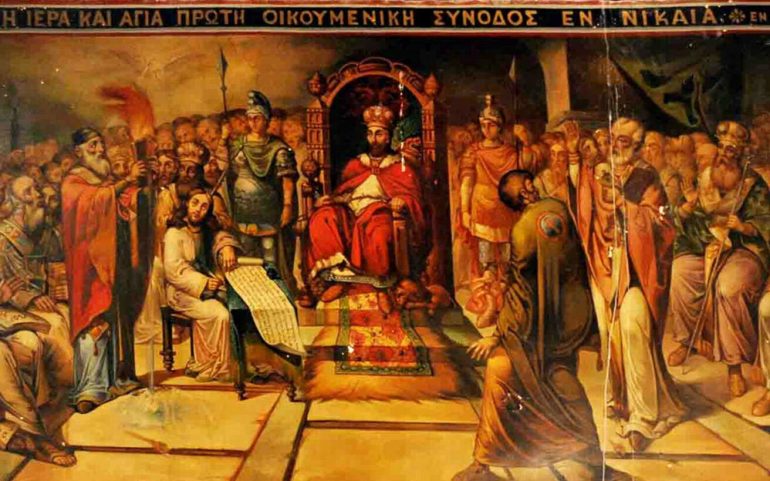After the end of what historians call the "first Christian years" and the cessation of persecution of believers in religion that at that time was only 300 years old, most believed that the time had come for the development of Christianity and spread to the ends of the universe.
However, this did not turn out to be easy. Conflicts of power and primacy proved to be stronger than the Christian faith, and so the new religion was suddenly found in the face of a religious impasse. In a dogmatic threat that was capable of destroying it.
Then, however, the man took action who, with his basic weapons, politics, diplomacy and underground consultations, succeeded and changed the flow of things by using a single word whose power reaches us to this day.
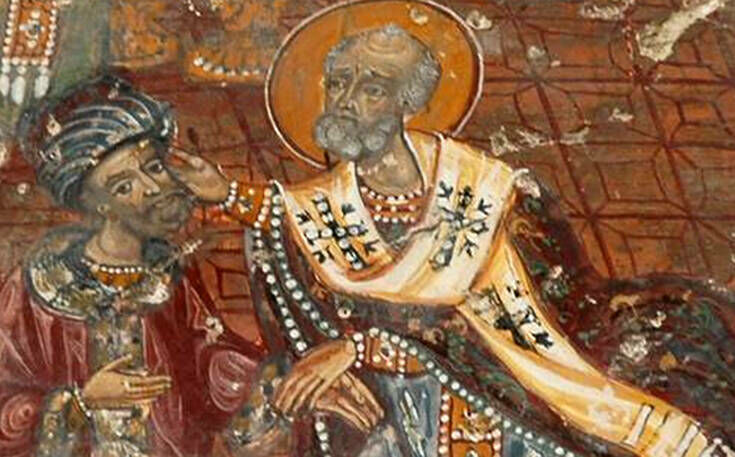
According to historians (although when we talk about those years, we should be very careful) around 256 AD. was born in Libya Arios who from a young age was dedicated to God. He is a young man who had a great education and deep faith. The vast and important knowledge he had acquired, however, led him to what the then official church called the "wrong path."
She followed various heretics trying to find unknown aspects of her religion. To study and why not change its basic rules.
It is said that Arios received ridiculous behavior from great bishops of that time, something that stigmatized him and made him even more stubborn.
Gradually, Arios began to develop his own doctrine. According to this, the Son (Jesus Christ, that is) is not by nature and essentially true. God.
It was created by God the Father at a specific time "in time". For this reason he could not be described as unborn, nor part of an unborn. It was, therefore, a simple building of God.
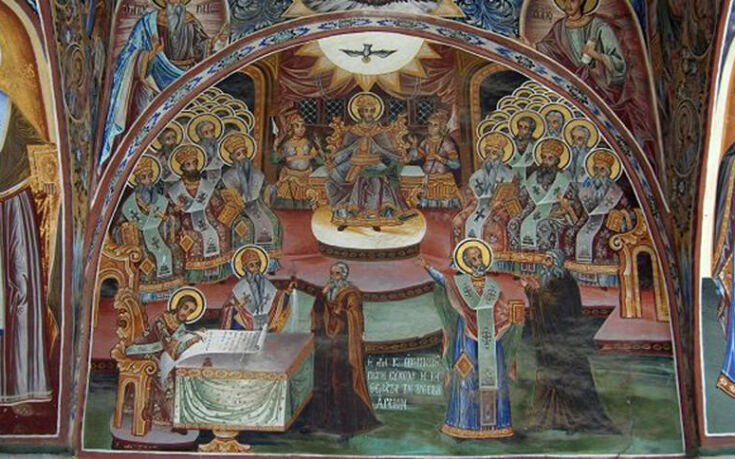
Arius supported the absolute monarchy of the deity and accepted an unborn and anarchic God. Therefore, before the creation of the Son, the "monarchy" of the only unborn and anarchic God was absolute, which is why God was not the Father before He created the Son, and the Son did not exist before He was created by the Father.
In short, what Arius was trying to do was to use the theological concepts of fatherhood and sonship metaphorically and in proportion to human life, in which the father precedes his son in time. In other words, she tried to explain the relationships of her Persons based on human relationships Holy Trinity.
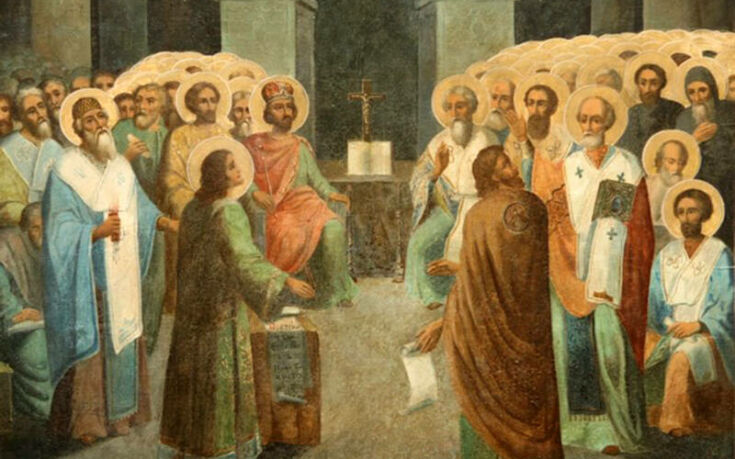
All of this, of course, would not have bothered the official church at that time if the teaching of Arius had not begun to resonate with the faithful who were watching his teachings carefully. And so Christianity came face to face with the first great internal threat.
We are now in the year 325 AD. during the reign of M. Constantine, who was suddenly confronted with a sect with very serious implications for the cohesion of the empire. Others had preceded it heretics efforts (such as the Schism of Melitios about 50 years earlier, supported, in fact, by Arios) but none had frightened the empire so much as it now touched the core of Christianity.
The emperor, who longed for religious supremacy in the empire and did not understand the dogmatic differences of the Aryan teaching from the Orthodox point of view, tried to appease the spirits of theological opponents without succeeding, but the differences became more and more acute. intense.
It is said that the first to speak to M. Constantinos about the impending danger was Kordouis Osios, who, in fact, proposed to him to convene an Ecumenical Council in order to finally resolve the dispute. And that's how it happened.
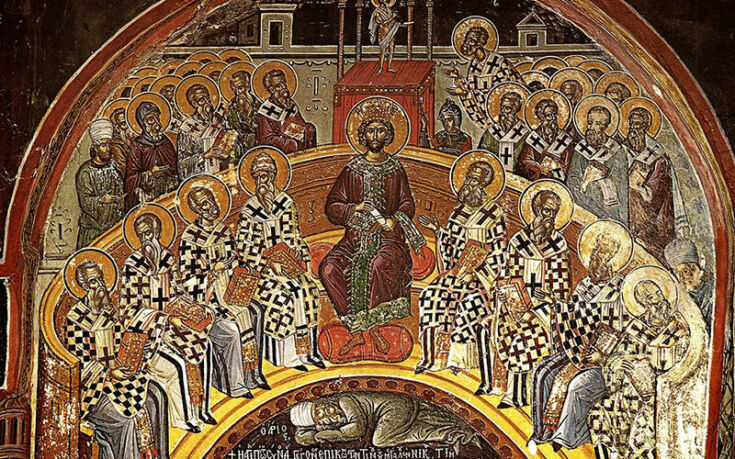
M. Constantinos defines Nicaea of Bithynia as the place that will host the Synod and this is because having decided to participate and he wanted a place near Istanbul in order to be easy to get there. He wanted to be there in order to take over the presidency of the Synod and in his presence to push for a solution.
The meeting was attended by 318 Fathers, including Agios Athanasios, Agios Spyridonas and Saint Nicholas. The vast majority of participants were from the Greek-speaking East and Asia Minor. The West was not so interested. Only one bishop from Italy, one from Galatia and one from Illyricum participated. Five bishops from provinces beyond the eastern borders of the Empire were also present.
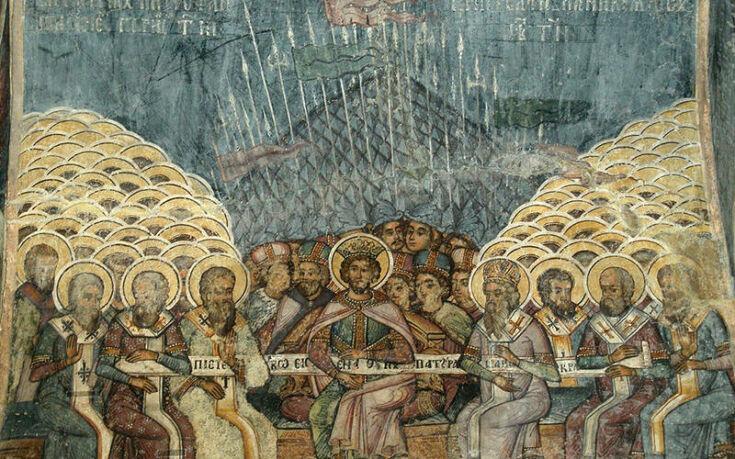
The First Ecumenical Council took many crucial decisions. So important that they are considered to have had long-term theological and political influences in the East throughout the Middle Ages.
Indicatively, it should be mentioned that the date of the celebration of Easter has been set, h Εκκλησία became part of the official structures of the Roman Empire and the synodal institution became of fundamental importance to Orthodox Christianity.
Everyone knew, however, that all of this, albeit significant, was of secondary importance. The great battle would be fought for "Arianism".
The underground consultations are many. The power struggles even more. The emperor, however, was unwilling to let the discord disintegrate Christianity and thus took active action. After his inaugural address, the emperor took and burned written requests previously handed over to him by the bishops, which contained mutual accusations, saying: "Christ demands from him who seeks forgiveness to forgive his brother."
It is characteristic, in fact, that when Constantine saw that some people were reacting to his presence there, addressing the Bishops-Fathers, according to the historian Eusebius, he said the phrase: to be an external bishop under God ”!
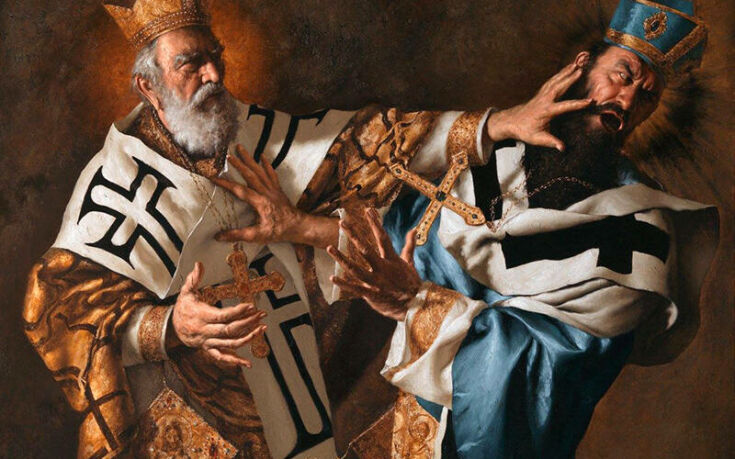
Even so, owning one is still beyond the reach of the average person. In one of them, Agios Nikolaos, unable to contain his indignation at what Arios was supporting, slapped him! M. Konstantinos punished Nikolaos with imprisonment. According to the patriarchal texts, however, a miracle took place inside the prison, showing the holiness of Nicholas and the delusion of Areios.
During the Summit, Constantine used all his diplomatic experience and tried to bring the two sides closer.
He therefore gave the floor to the well-known ecclesiastical historian and Biblical commentator Eusebius of Caesarea (one of the most well-known supporters of the Aryan sect) to publicly express his faith and "restore his name."
To this end, Eusebius cited the baptismal symbol of faith in the church of Caesarea, which stated that Jesus Christ he was "the Word of God," "the only begotten Son," "born of God before all ages," and He "through whom all things were made." The positions expressed by the symbol were Orthodox and the emperor realized that this could be the basis for a joint compromise. Constantine accepted this symbol of faith and thus removed from Eusebius the rebuke of the heretic.
Constantine then suggested adding the word homosexual, which would clarify the unity and equality of Jesus Christ and Son with God and the Father in the definition of faith regarding the Christian Deity. If, in fact, he persuaded Eusebius to accept this word, he believed that he possessed the "key" that could unite the majority of the episcopal leaders in a common consensus and isolate the minority of the extreme Martians as a heresy.
Eusebius, although initially cautious, then accepted the emperor's intervention, thus achieving a theological setback.
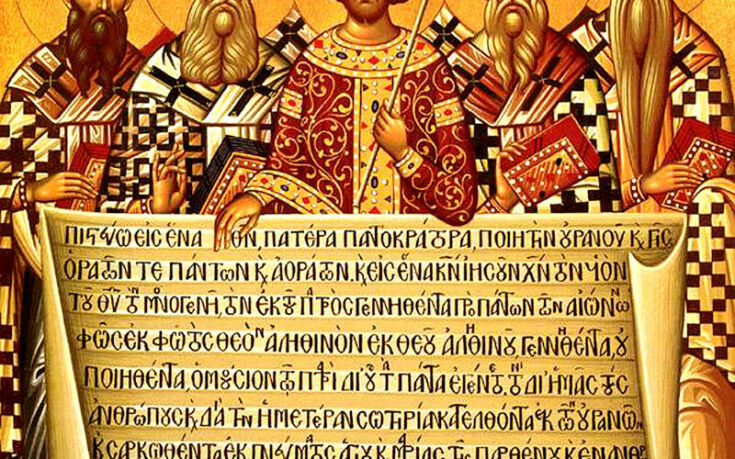
A committee was then set up to draft a statement of faith based on baptismal symbols of faith, which, however, would incorporate anti-mountain phrases. Within a few days, the committee produced the statement that is still known today as the "Symbol of Faith of Nicaea" which is the first part of the Creed.
After two months and twelve days, the Summit was over. The Emperor gained time and of course the unity of the church. But again everything seemed extremely fragile and this was proved by the death of Arios in 336 AD. in Constantinople. Officially, his death was attributed to unknown causes. For the few remaining believers, however, Arios was poisoned by his enemies.
